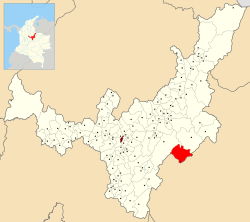Pajarito, Boyacá facts for kids
Quick facts for kids
Pajarito
|
||
|---|---|---|
|
Municipality and town
|
||
|
||

Location of the municipality and town of Pajarito in the Boyacá department of Colombia
|
||
| Country | ||
| Department | Boyacá Department | |
| Province | La Libertad Province | |
| Founded | 1 January 1853 | |
| Area | ||
| • Municipality and town | 322 km2 (124 sq mi) | |
| Elevation | 800 m (2,600 ft) | |
| Population
(2015)
|
||
| • Municipality and town | 1,719 | |
| • Density | 5.339/km2 (13.827/sq mi) | |
| • Urban | 725 | |
| Time zone | UTC-5 (Colombia Standard Time) | |
| Website | Official website: http://www.pajarito-boyaca.gov.co/ | |
Pajarito is a small town and municipality in Colombia. It is located in the Boyacá department, in an area called the La Libertad Province. The town is in the southeast part of the department.
Pajarito shares its borders with other towns like Labranzagrande and Aquitania in Boyacá. It also borders Yopal, Recetor, and Aguazul in the Casanare department. The main part of Pajarito is about 147 kilometers (91 miles) from Tunja, which is the capital city of Boyacá.
The town sits at an elevation of about 800 meters (2,625 feet) above sea level. It is in a narrow valley, which means there isn't much space for the town to grow. Because of its location, the town sometimes experiences landslides.
Contents
What's in a Name?
The name Pajarito means "little bird" in Spanish. However, people think the name actually comes from the Chibcha language. In Chibcha, Pa means "father," ja means "load" or "role," and rito means "dog." So, the original meaning might be quite different from "little bird"!
How the Land Was Formed
The land around Pajarito has special rocks. These rocks were formed when hot, melted rock pushed its way into older layers of rock. These older rocks were laid down during the Lower Cretaceous period. The rocks in Pajarito are unique because they have low amounts of a substance called SiO2. You can also find tiny crystals of apatite and chlorite here.
A Look Back in Time
Early Inhabitants
The very first people to live in the area of Pajarito might have been native people from the Golconda tribe. These people were known for being short and having bowed legs. They were skilled farmers who grew maize (corn) and also hunted for food. They spoke a language that was a type of Chibcha, which is where the town's name might have come from.
Founding of Modern Pajarito
The modern town of Pajarito was officially started on January 1, 1853. It was founded by soldiers from Gran Colombia, which was a large country in South America at that time. The first leaders, or mayors, of Pajarito were also military men.
How People Make a Living
Pajarito is mostly a rural community. This means that most people live in the countryside and work with the land. The main jobs in Pajarito are agriculture (farming) and livestock farming (raising animals).
Main Farm Products
Farmers in Pajarito grow many different crops. Some of the most important ones include:
Outside the main town area, there are also natural hot springs. These are places where warm water comes up from underground.
Weather in Pajarito
Pajarito has a tropical monsoon climate. This means it has two main seasons:
- Dry Season: From December to March, there is not much rain.
- Wet Season: From April to November, there is a lot of rain, sometimes very heavy.
The weather is generally warm all year round.
| Climate data for Pajarito (Corinto), elevation 1,550 m (5,090 ft), (1981–2010) | |||||||||||||
|---|---|---|---|---|---|---|---|---|---|---|---|---|---|
| Month | Jan | Feb | Mar | Apr | May | Jun | Jul | Aug | Sep | Oct | Nov | Dec | Year |
| Mean daily maximum °C (°F) | 24.1 (75.4) |
24.8 (76.6) |
24.2 (75.6) |
23.7 (74.7) |
23.5 (74.3) |
22.8 (73.0) |
22.1 (71.8) |
22.7 (72.9) |
23.4 (74.1) |
23.7 (74.7) |
23.5 (74.3) |
24.0 (75.2) |
23.5 (74.3) |
| Daily mean °C (°F) | 19.1 (66.4) |
19.5 (67.1) |
19.4 (66.9) |
19.1 (66.4) |
18.9 (66.0) |
18.4 (65.1) |
18.0 (64.4) |
18.1 (64.6) |
18.5 (65.3) |
18.9 (66.0) |
19.0 (66.2) |
19.2 (66.6) |
18.8 (65.8) |
| Mean daily minimum °C (°F) | 13.4 (56.1) |
14.1 (57.4) |
14.6 (58.3) |
15.0 (59.0) |
15.0 (59.0) |
14.7 (58.5) |
14.3 (57.7) |
14.2 (57.6) |
14.1 (57.4) |
14.3 (57.7) |
14.4 (57.9) |
13.6 (56.5) |
14.3 (57.7) |
| Average precipitation mm (inches) | 47.4 (1.87) |
66.0 (2.60) |
130.1 (5.12) |
267.4 (10.53) |
385.9 (15.19) |
394.0 (15.51) |
397.2 (15.64) |
361.4 (14.23) |
352.8 (13.89) |
336.1 (13.23) |
240.7 (9.48) |
74.9 (2.95) |
3,054 (120.2) |
| Average precipitation days (≥ 1.0 mm) | 9 | 10 | 15 | 22 | 25 | 26 | 27 | 27 | 25 | 26 | 22 | 13 | 240 |
| Average relative humidity (%) | 86 | 85 | 86 | 90 | 91 | 92 | 92 | 91 | 90 | 89 | 90 | 88 | 89 |
| Source: Instituto de Hidrologia Meteorologia y Estudios Ambientales | |||||||||||||
See also
 In Spanish: Pajarito (Boyacá) para niños
In Spanish: Pajarito (Boyacá) para niños
 | Bayard Rustin |
 | Jeannette Carter |
 | Jeremiah A. Brown |


